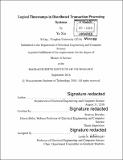Logical timestamps in distributed transaction processing systems
Author(s)
Xia, Yu(Scientist in electrical engineering and computer science)Massachusetts Institute of Technology.
Download1126661675-MIT.pdf (7.998Mb)
Other Contributors
Massachusetts Institute of Technology. Department of Electrical Engineering and Computer Science.
Advisor
Srinivas Devadas.
Terms of use
Metadata
Show full item recordAbstract
Distributed transactions are such transactions with remote data access. They usually suffer from high network latency (compared to the internal overhead) during data operations on remote data servers, and therefore lengthen the entire transaction executiont time. This increases the probability of conflicting with other transactions, causing high abort rates. This, in turn, causes poor performance. In this work, we constructed Sundial, a distributed concurrency control algorithm that applies logical timestamps seaminglessly with a cache protocol, and works in a hybrid fashion where an optimistic approach is combined with lock-based schemes. Sundial tackles the inefficiency problem in two ways. Firstly, Sundial decides the order of transactions on the fly. Transactions get their commit timestamp according to their data access traces. Each data item in the database has logical leases maintained by the system. A lease corresponds to a version of the item. At any logical time point, only a single transaction holds the 'lease' for any particular data item. Therefore, lease holders do not have to worry about someone else writing to the item because in the logical timeline, the data writer needs to acquire a new lease which is disjoint from the holder's. This lease information is used to calculate the logical commit time for transactions. Secondly, Sundial has a novel caching scheme that works together with logical leases. The scheme allows the local data server to automatically cache data from the remote server while preserving data coherence. We benchmarked Sundial along with state-of-the-art distributed transactional concurrency control protocols. On YCSB, Sundial outperforms the second best protocol by 57% under high data access contention. On TPC-C, Sundial has a 34% improvement over the state-of-the-art candidate. Our caching scheme has performance gain comparable with hand-optimized data replication. With high access skew, it speeds the workload by up to 4.6 x.
Description
Thesis: S.M., Massachusetts Institute of Technology, Department of Electrical Engineering and Computer Science, 2018 Cataloged from PDF version of thesis. Includes bibliographical references (pages 73-79).
Date issued
2018Department
Massachusetts Institute of Technology. Department of Electrical Engineering and Computer SciencePublisher
Massachusetts Institute of Technology
Keywords
Electrical Engineering and Computer Science.